-
 Bitcoin
Bitcoin $114100
-0.14% -
 Ethereum
Ethereum $3635
-0.73% -
 XRP
XRP $2.949
-2.85% -
 Tether USDt
Tether USDt $0.9999
-0.03% -
 BNB
BNB $760.3
-0.78% -
 Solana
Solana $163.8
-2.77% -
 USDC
USDC $0.9998
-0.04% -
 TRON
TRON $0.3323
-0.57% -
 Dogecoin
Dogecoin $0.2004
-2.99% -
 Cardano
Cardano $0.7245
-2.87% -
 Hyperliquid
Hyperliquid $37.52
-3.75% -
 Stellar
Stellar $0.3915
-3.58% -
 Sui
Sui $3.416
-2.20% -
 Bitcoin Cash
Bitcoin Cash $559.5
-0.84% -
 Chainlink
Chainlink $16.41
-2.16% -
 Hedera
Hedera $0.2406
-1.78% -
 Ethena USDe
Ethena USDe $1.001
0.00% -
 Avalanche
Avalanche $22.13
-1.98% -
 Litecoin
Litecoin $117.8
-4.32% -
 UNUS SED LEO
UNUS SED LEO $8.989
0.01% -
 Toncoin
Toncoin $3.183
-5.09% -
 Shiba Inu
Shiba Inu $0.00001214
-1.97% -
 Uniswap
Uniswap $9.654
-1.71% -
 Polkadot
Polkadot $3.616
-1.18% -
 Monero
Monero $291.6
-2.66% -
 Dai
Dai $0.9999
0.00% -
 Bitget Token
Bitget Token $4.310
-1.10% -
 Cronos
Cronos $0.1382
-1.93% -
 Pepe
Pepe $0.00001021
-3.40% -
 Aave
Aave $257.9
-1.42%
how to buy crypto in usa for beginners
To start investing in cryptocurrencies, first consider your financial goals and choose a reputable exchange that offers robust security, high liquidity, and competitive fees.
Jan 27, 2025 at 07:54 pm

Key Points:
- Choose a reputable cryptocurrency exchange
- Determine the amount of money you want to invest
- Select the cryptocurrencies you want to buy
- Fund your exchange account with USD
- Place a buy order for the desired cryptocurrencies
Choose a Reputable Cryptocurrency Exchange
- Consider security: Look for exchanges with robust security protocols, such as two-factor authentication, cold storage, and regulatory compliance.
- Assess liquidity: Choose exchanges with high trading volume to ensure you can easily buy and sell your cryptocurrencies.
Compare fees: Excluding FTX, here are some of the top exchanges in the US based on fees:
- Binance.US: 0.1% trading fee
- Kraken: 0.26% trading fee
- Coinbase: 0.5% trading fee
- Check customer support: Ensure the exchange offers responsive customer support in case you encounter any issues.
Determine the Amount of Money You Want to Invest
- Start small: Consider investing only as much as you can afford to lose, especially if you're a beginner.
- Diversify your investments: Don't put all your money in one cryptocurrency. Spread your funds across different assets to mitigate risk.
- Consider your financial goals: Factor in your short- and long-term financial plans when determining your investment amount.
Select the Cryptocurrencies You Want to Buy
- Research different cryptocurrencies: Familiarize yourself with the projects behind the cryptocurrencies you're considering.
- Choose established coins: Consider investing in well-established cryptocurrencies to minimize risk, such as Bitcoin (BTC), Ethereum (ETH), or Litecoin (LTC).
- Explore other options: If you're comfortable with higher risk, you can also explore altcoins, such as Dogecoin (DOGE) or Shiba Inu (SHIB).
Fund Your Exchange Account with USD
- Connect your bank account: Most exchanges allow you to connect your bank account and transfer funds using ACH or wire transfer.
- Use a debit/credit card: Some exchanges also accept debit and credit card payments, albeit with higher fees.
- Pay with a third-party provider: You can use companies like PayPal or Google Pay to fund your exchange account.
Place a Buy Order for the Desired Cryptocurrencies
- Select the cryptocurrency pair: Choose the trading pair that matches your desired cryptocurrency and USD.
- Specify the amount: Enter the amount of cryptocurrency you want to buy in USD or the equivalent cryptocurrency amount.
- Place the order: Review the order details and confirm it to execute the purchase.
- Monitor your investment: Track the price of your cryptocurrencies over time and adjust your strategy as necessary.
FAQs:
- Is it legal to buy crypto in the USA? Yes, buying and owning cryptocurrencies is legal in the US.
- How do I store my cryptocurrencies? You can store your cryptocurrencies in a hardware wallet, software wallet, or on the exchange where you purchased them.
- Can I use my debit card to buy crypto? Some exchanges allow debit card purchases, but they may incur higher fees.
- How much does it cost to buy crypto? Transaction fees vary depending on the exchange and payment method.
- What are some tips for beginners? Research different cryptocurrencies, invest only as much as you can afford to lose, and diversify your investments.
Disclaimer:info@kdj.com
The information provided is not trading advice. kdj.com does not assume any responsibility for any investments made based on the information provided in this article. Cryptocurrencies are highly volatile and it is highly recommended that you invest with caution after thorough research!
If you believe that the content used on this website infringes your copyright, please contact us immediately (info@kdj.com) and we will delete it promptly.
- Acapulco Crafts in Crisis: Sales Plummet, Artisans Struggle
- 2025-08-06 14:30:12
- SEC, Crypto & Bitwise CIO: A New Dawn?
- 2025-08-06 14:35:11
- Coinbase, Financing, and the Crypto Market: Navigating Choppy Waters in NYC Style
- 2025-08-06 12:50:11
- Bitcoin in Indonesia: Crypto Education and Economic Strategy
- 2025-08-06 12:50:11
- DeriW Mainnet: Zero Gas Fees Revolutionize On-Chain Derivatives Trading
- 2025-08-06 10:30:11
- IOTA, Cloud Mining, and Eco-Friendly Crypto: A New York Investor's Take
- 2025-08-06 10:30:11
Related knowledge

What is Ethereum’s Slashing mechanism and how to punish malicious behavior?
Feb 20,2025 at 03:08am
Key PointsOverview of slashingDifferent types of slashing in EthereumIncentives and consequences of slashingIdentifying and reporting slashed validato...

What is the verifier node of Ethereum and how to become a verifier?
Feb 19,2025 at 06:00pm
The Verifier Node of Ethereum: A Comprehensive GuideKey Points:What is a Verifier Node?How to Become a Verifier NodeResponsibilities and Rewards of a ...

What is Ethereum’s staking, and how to participate and earn money?
Feb 19,2025 at 04:37pm
Key Points:Understanding Ethereum's Staking MechanismSteps to Participate in StakingBenefits and Rewards of StakingSecurity and Risk ConsiderationsTec...

What is Ethereum’s DAO (Decentralized Autonomous Organization) and how does it work?
Feb 20,2025 at 03:12am
Key PointsDefinition and Structure of a DAOGovernance and Decision-Making in DAOsBenefits and Use Cases of DAOsChallenges and Limitations of DAOsWhat ...

What is Ethereum's multi-signature wallet and how to improve security?
Feb 20,2025 at 02:18pm
Key Points:Understanding the Concept of a Multi-Signature WalletBenefits and Drawbacks of Multisig WalletsRequirements for Setting Up a Multisig Walle...

What is Ethereum's oracle and how to provide data for smart contracts?
Feb 21,2025 at 01:30am
Key Points:Understanding the concept of oracles in EthereumExploring different types of oraclesDetailed guide on how to provide data for smart contrac...

What is Ethereum’s Slashing mechanism and how to punish malicious behavior?
Feb 20,2025 at 03:08am
Key PointsOverview of slashingDifferent types of slashing in EthereumIncentives and consequences of slashingIdentifying and reporting slashed validato...

What is the verifier node of Ethereum and how to become a verifier?
Feb 19,2025 at 06:00pm
The Verifier Node of Ethereum: A Comprehensive GuideKey Points:What is a Verifier Node?How to Become a Verifier NodeResponsibilities and Rewards of a ...

What is Ethereum’s staking, and how to participate and earn money?
Feb 19,2025 at 04:37pm
Key Points:Understanding Ethereum's Staking MechanismSteps to Participate in StakingBenefits and Rewards of StakingSecurity and Risk ConsiderationsTec...

What is Ethereum’s DAO (Decentralized Autonomous Organization) and how does it work?
Feb 20,2025 at 03:12am
Key PointsDefinition and Structure of a DAOGovernance and Decision-Making in DAOsBenefits and Use Cases of DAOsChallenges and Limitations of DAOsWhat ...

What is Ethereum's multi-signature wallet and how to improve security?
Feb 20,2025 at 02:18pm
Key Points:Understanding the Concept of a Multi-Signature WalletBenefits and Drawbacks of Multisig WalletsRequirements for Setting Up a Multisig Walle...

What is Ethereum's oracle and how to provide data for smart contracts?
Feb 21,2025 at 01:30am
Key Points:Understanding the concept of oracles in EthereumExploring different types of oraclesDetailed guide on how to provide data for smart contrac...
See all articles

























































































